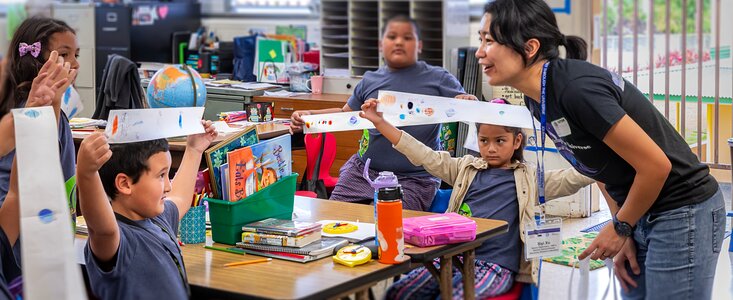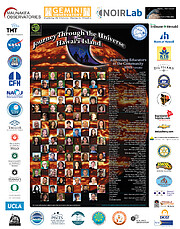Journey Through the Universe 2022
NSF NOIRLab celebrates 18 years of the flagship outreach program in Hawai‘i with a packed schedule and a new educational cultural exchange
15 February 2022
NOIRLab's Journey Through the Universe — returning with an online program this year — will share the wonders of the Universe and career awareness in science and technology with Hawaiʻi students. In partnership with the Hawaiʻi Department of Education Hilo-Waiakea Complex Area, this year’s implementation of the flagship astronomy outreach program consists of a week of virtual programming along with a new cultural exchange program between classrooms in NOIRLab’s host cities in Hawaiʻi, Chile, and Arizona.
Hawai‘i Island’s leading astronomy education and outreach program, Journey Through the Universe (Journey), will return for its 18th year from 28 February to 4 March 2022. This year’s program will consist of virtual science presentations and career panels for classes from kindergarten through to the 12th grade. This virtual implementation of Journey (Journey was held entirely in-person for its first 16 years) allows additional participation by classes beyond the Hilo-Waiakea Complex Area, in addition to the core partnership with the Hilo-Waiakea schools. Journey is also open to teachers partnered with participating organizations, including the Maunakea Observatories, NASA, the University of Hawaii at Hilo, and the National Solar Observatory.
Journey, which began as a Gemini Observatory program and is now coordinated by NSF’s NOIRLab, promotes science education and inspires students to explore Science, Technology, Engineering, and Math (STEM) subjects by developing literacy in science. The program endeavors to foster curiosity and wonder about our Universe, possible observatory careers, and the cutting-edge research and technology that is allowing us to understand our place in the cosmos.
Originally developed by the National Center for Earth and Space Science Education (NCESSE), Journey has expanded each year since its introduction in 2005. The success of Journey over the past 18 years is evidence of the support from local community partners across government, business, astronomy, and higher education, as well as the strength of our foundational partnership with the Hawaiʻi State Department of Education. Journey is a long-lasting NOIRLab public outreach program that has only been possible because of NOIRLab’s community partnerships, particularly with the Hawai‘i Department of Education Hilo-Waiakea Complex Area.
“The Journey Through the Universe partnership is one of the longest and most impactful that I know of for the Hilo-Waiākea Complex of the Hawaiʻi Department of Education,” explained Esther Kanehailua, Complex Superintendent. “The dedicated staff from all of the Maunakea Observatories have visited our classrooms with incredible energy and a passion for exploration on our island and beyond, inspiring our future leaders.” Kanehailua adds that students who have participated in Journey have returned as science educators in local schools which is an indicator of the impact of the Journey program.
“Journey Through the Universe would not succeed without the help of our community partners and sponsors, including the Department of Education, Hawai‘i Island business community, Maunakea Observatories, and NASA, among many others,” said Janice Harvey, Journey Through the Universe program coordinator at NOIRLab. “Their continued support is a demonstration of their commitment to our community and the future of science education for students in Hawai‘i and beyond.”
Career panels featuring professionals from local observatories and astronomy organizations from around the world are an important part of the Journey program. These panels allow students to discover the wide range of educational possibilities and career opportunities available both at observatories and within the wider field of astronomy and space science. According to Jocelyn Ferrara, Science Operations Specialist at Gemini Observatory and frequent astronomy educator for Journey, the panels inspire inclusivity and genuine connection: “Thinking about a career can be a really overwhelming task for some kids, including myself in the past. Journey gives me the opportunity to express that STEM is for everyone, not just ‘geniuses’! I hope that sharing my story, getting vulnerable, and simply showing up as an example can make a difference and help them realize that with dedication and support, these jobs are truly within their reach.”
As well as the virtual presentations and career panels, this year’s Journey program will feature Journey Through NOIRLab, a cultural and educational exchange between classrooms in NOIRLab’s host cities of Hilo, Hawaiʻi; La Serena, Chile; and Tucson, Arizona. Participating teachers will benefit from one-on-one teacher partnerships between different locations — based on grade level — and four live Zoom sessions per school year for all participating classes.
“NOIRLab is leading the way in sharing the wonders of modern astronomy with students in its local communities, an activity that NSF whole-heartedly supports,” notes Chris Davis, NSF’s Program Director for NOIRLab.
In celebration of the many local community organizations, volunteers, principals, and teachers who support Journey, the Hawaiʻi Island Chamber of Commerce and the Japanese Chamber of Commerce & Industry of Hawaiʻi will host its annual Journey Through the Universe welcome reception online at the start of Journey week. This event will bring the many stakeholders of this program together with its participants to share in our vision of science education for the students of Hawaiʻi.
More information
NSF NOIRLab(National Optical-Infrared Astronomy Research Laboratory), the US center for ground-based optical-infrared astronomy, operates the International Gemini Observatory(a facility of NSF, NRC–Canada, ANID–Chile, MCTIC–Brazil, MINCyT–Argentina, and KASI–Republic of Korea), Kitt Peak National Observatory (KPNO), Cerro Tololo Inter-American Observatory (CTIO), the Community Science and Data Center (CSDC), and Vera C. Rubin Observatory(operated in cooperation with the Department of Energy’s SLACNational Accelerator Laboratory). It is managed by the Association of Universities for Research in Astronomy (AURA) under a cooperative agreement with NSF and is headquartered in Tucson, Arizona. The astronomical community is honored to have the opportunity to conduct astronomical research on Iolkam Du’ag (Kitt Peak) in Arizona, on Maunakea in Hawai‘i, and on Cerro Tololo and Cerro Pachón in Chile. We recognize and acknowledge the very significant cultural role and reverence that these sites have to the Tohono O'odham Nation, to the Native Hawaiian community, and to the local communities in Chile, respectively.
Journey Through the Universe is organized by NSF NOIRLab/Gemini Observatory and supported by the following partners (listed in alphabetical order): Bank of Hawai‘i, Basically Books, Big Island Candies, Big Island Toyota, California Institute of Technology, Caltech Submillimeter Observatory, Canada-France-Hawai‘i Telescope, Daniel K. Inouye Solar Telescope, DeLuz Chevrolet, Hawai‘i Community College, Hawai‘i Electric Light Company, Hawai‘i Island Chamber of Commerce Hawai‘i Island Economic Development Board, Hawai‘i State Department of Education, Hawai‘i Science and Technology Museum Hawai‘i Tribune-Herald, ‘Imiloa Astronomy Center, James Clerk Maxwell Telescope, East Asian Observatory, Japanese Chamber of Commerce & Industry, KTA Superstores, KWXX Radio Station/New West Broadcasting, Maunakea Astronomy Outreach Committee, Maunakea Observatories, Maunakea Support Services, Maunakea Visitor Information Station NASA Infrared Telescope Facility, NASA Marshall Space Flight Center, National Astronomical Observatory of Japan, National Center for Earth & Space Science, National Radio Astronomy Observatory National Solar Observatory, Pacific Science Center, Pacific International Space Center for Exploration Systems, Project Astro/Family Astro, Rotary Club of Hilo Bay, Smithsonian Submillimeter Array Subaru Telescope, Thirty Meter Telescope, Thirty Meter Telescope–Japan, UH Hilo College of Pharmacy, UH Institute for Astronomy, United Kingdom Infrared Telescope, University of California–Los Angeles University of Hawai‘i at Hilo, University of Hawai‘i at Manoa, University of Oregon, Very Long Baseline Array, W.M. Keck Observatory.
Contacts
Janice Harvey
Hawaiʻi Education and Engagement Manager
NSF NOIRLab
Email: janice.harvey@noirlab.edu
Leinani Lozi
Outreach Assistant
NSF NOIRLab
Email: leinani.lozi@noirlab.edu
Vanessa Thomas
Public Information Officer
NSF NOIRLab
Tel: +1 520 318 8132
Email: vanessa.thomas@noirlab.edu







